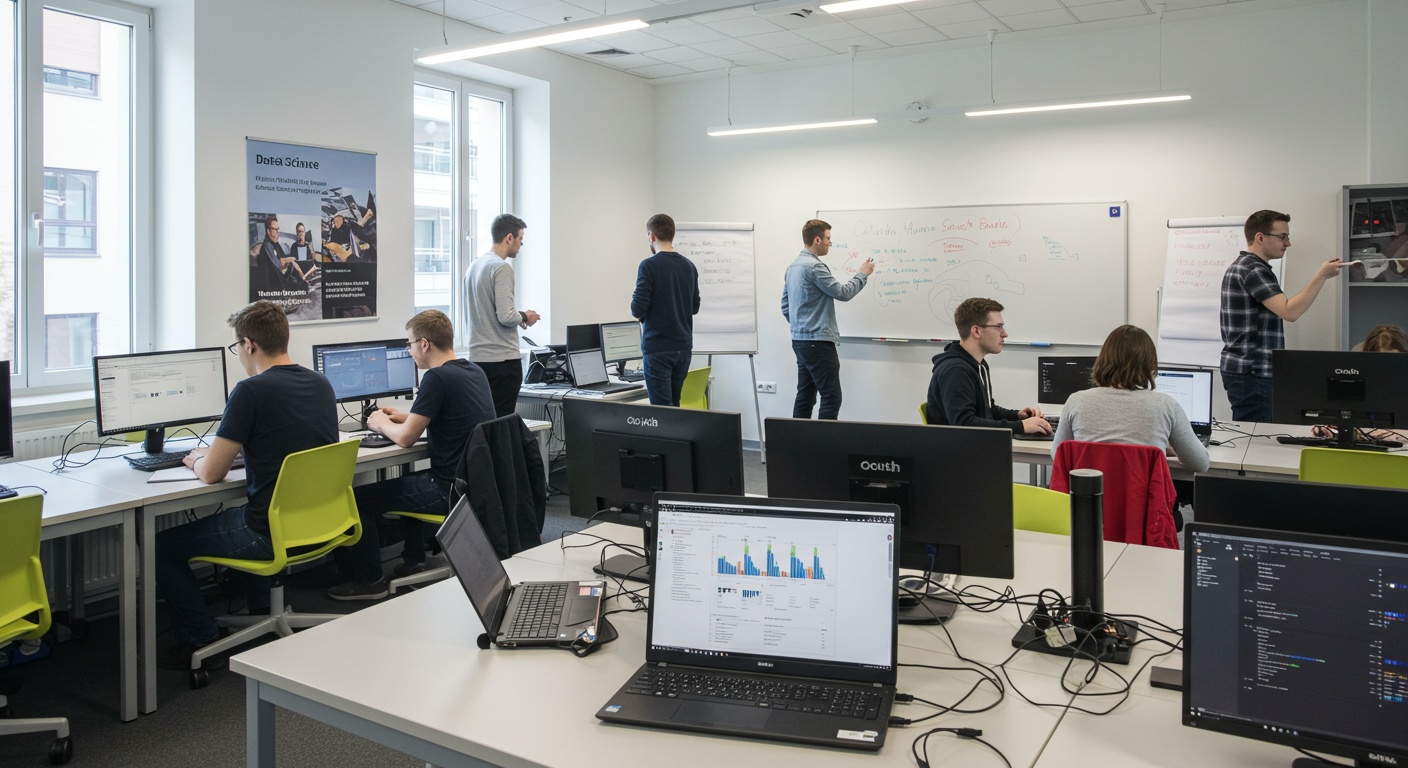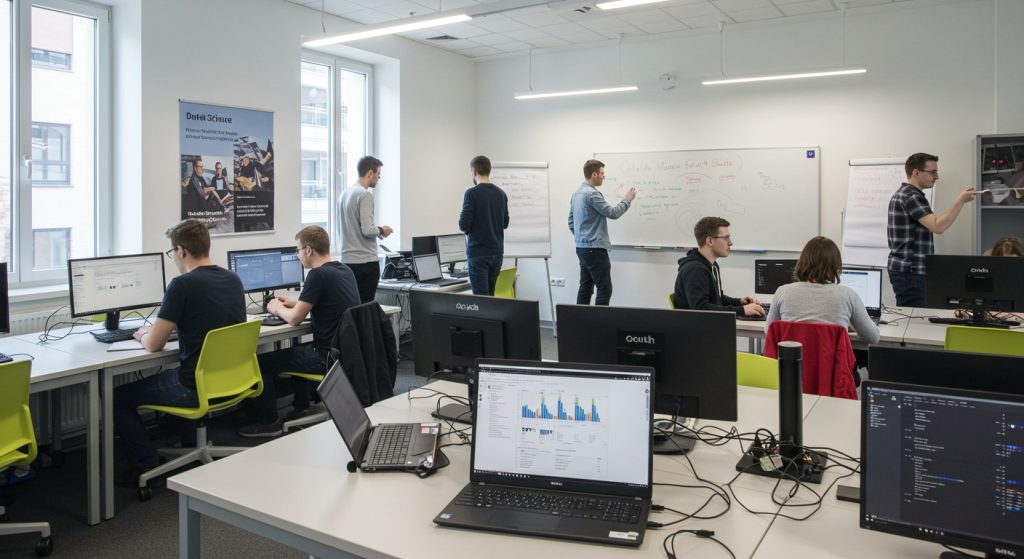Germany’s data science landscape is booming, driven by Industry 4. 0 and a national AI strategy demanding skilled professionals. But navigating the academic options can be overwhelming. This exploration focuses on Germany’s leading universities and their data science programs, highlighting key benefits like specialized tracks in areas like machine learning for computer vision or natural language processing, reflecting current industry needs. We’ll delve into learning outcomes, showcasing how programs integrate theoretical foundations with practical applications through real-world projects and industry collaborations, examining curriculum structure through the lens of necessary skills for building impactful solutions. This offers insights for prospective students aiming to launch successful data science careers.

Why Study Data Science in Germany?
Germany has emerged as a prominent hub for Data Science, attracting students and professionals alike. Several factors contribute to this rise:
- Strong Economy: Germany boasts one of the largest and most stable economies in Europe, creating a high demand for data scientists across various industries.
- Technological Advancement: The country is a leader in engineering, manufacturing. Automotive industries, all of which heavily rely on data-driven decision-making.
- High-Quality Education: German universities are renowned for their rigorous academic standards, research opportunities. Internationally recognized degrees.
- Affordable Tuition: Compared to other popular study destinations like the US or the UK, many German universities offer free or very low tuition fees, especially for undergraduate and some postgraduate programs.
- Career Opportunities: The demand for data scientists in Germany is constantly growing, offering excellent career prospects for graduates.
Understanding Key Data Science Concepts
Before diving into specific universities, let’s clarify some core concepts in Data Science. Data Science is an interdisciplinary field that uses scientific methods, processes, algorithms and systems to extract knowledge and insights from structured and unstructured data. It encompasses several related fields:
- Machine Learning (ML): A type of artificial intelligence (AI) that allows computer systems to learn from data without being explicitly programmed. Common ML algorithms include linear regression, logistic regression, decision trees, support vector machines (SVMs). Neural networks.
- Artificial Intelligence (AI): A broader concept that refers to the development of computer systems that can perform tasks that typically require human intelligence, such as learning, problem-solving. Decision-making.
- Data Mining: The process of discovering patterns and insights from large datasets. This often involves using statistical techniques and machine learning algorithms.
- Big Data: Extremely large and complex datasets that are difficult to process using traditional data processing applications. Big data is often characterized by the “5 Vs”: Volume, Velocity, Variety, Veracity. Value.
- Data Visualization: The graphical representation of data to make it easier to comprehend and interpret. Tools like Tableau, Power BI. Python libraries like Matplotlib and Seaborn are commonly used.
- Statistical Analysis: Using statistical methods to review data, identify trends. Make predictions.
Leading German Universities for Data Science
Several German universities offer excellent Data Science programs, each with its own strengths and focus. Here’s a look at some of the leading institutions:
- Technical University of Munich (TUM): Known for its strong engineering and computer science programs, TUM offers a variety of Data Science related courses, including a dedicated Master’s program in Data Engineering and Analytics. TUM’s focus is on the more technical aspects of data science.
- Ludwig Maximilian University of Munich (LMU): LMU offers a Master’s program in Statistics and Data Science, with a strong emphasis on statistical modeling and data analysis. They provide strong foundations in statistical theory.
- Humboldt University of Berlin (HU Berlin): HU Berlin has a strong reputation in the humanities and social sciences. Also offers excellent Data Science programs, often with an interdisciplinary focus. The university has a Master’s program in Data Science that integrates aspects of computer science, mathematics. Statistics.
- RWTH Aachen University: RWTH Aachen is another leading technical university in Germany, offering programs in Data Science and related fields. Their focus is on the application of data science to engineering and manufacturing.
- University of Mannheim: The University of Mannheim has a strong business school, offering a Master’s program in Data Science that combines aspects of business analytics and data management. This university focuses more on business applications.
- Free University of Berlin (FU Berlin): FU Berlin provides a Master’s program in Data Science, which is renowned for its strong focus on both theoretical foundations and practical applications. The program integrates various disciplines, including computer science, mathematics. Statistics, to provide students with a comprehensive understanding of data science principles and techniques.
Comparing Data Science Programs: A Closer Look
To help you choose the right program, let’s compare some key aspects of the leading universities mentioned above:
| University | Program Name | Focus | Tuition Fees (per semester) | Language |
|---|---|---|---|---|
| TUM | Data Engineering and Analytics (MSc) | Technical, Engineering Applications | ~€144. 40 (Student Union Fee) | English |
| LMU | Statistics and Data Science (MSc) | Statistical Modeling, Data Analysis | ~€144. 30 (Student Union Fee) | English |
| HU Berlin | Data Science (MSc) | Interdisciplinary, Computer Science, Mathematics, Statistics | ~€315 (Including Semester Ticket) | English |
| RWTH Aachen | Data Science (MSc) | Engineering, Manufacturing | ~€300 (Social Contribution) | English |
| University of Mannheim | Data Science (MSc) | Business Analytics, Data Management | ~€200 (Semester Contribution) | English |
| FU Berlin | Data Science (MSc) | Theoretical Foundations, Practical Applications | ~€315 (Including Semester Ticket) | English |
Note: Tuition fees are subject to change. Always check the university’s official website for the most up-to-date data.
Real-World Applications and Use Cases
Data Science isn’t just an academic pursuit; it has profound implications for various industries. Here are some examples of how data science is being used in Germany:
- Automotive: Companies like BMW and Volkswagen use data science to optimize manufacturing processes, develop self-driving cars. Improve customer experience. For example, predictive maintenance algorithms assess sensor data from vehicles to anticipate potential failures and schedule maintenance proactively.
- Healthcare: Data Science is used to improve patient care, develop new drugs. Optimize hospital operations. For instance, machine learning models can examine medical images to detect diseases like cancer at an early stage.
- Finance: Banks and insurance companies use data science to detect fraud, assess risk. Personalize financial products. Algorithms can assess transaction data to identify suspicious patterns and prevent fraudulent activities.
- Manufacturing: Companies use data science to optimize production processes, improve quality control. Reduce waste. Statistical process control techniques help to monitor manufacturing processes and identify deviations from desired standards.
- Energy: Data Science is used to optimize energy consumption, predict energy demand. Develop renewable energy sources. Predictive models can forecast electricity demand based on weather patterns and consumer behavior.
Essential Skills for a Data Science Career
To succeed in a Data Science career, you’ll need a combination of technical and soft skills:
- Programming: Proficiency in programming languages like Python and R is essential. Python is particularly popular due to its extensive libraries for data analysis, machine learning. Data visualization (e. G. , Pandas, NumPy, Scikit-learn, Matplotlib, Seaborn).
- Statistical Analysis: A strong understanding of statistical concepts and methods is crucial for analyzing data and drawing meaningful conclusions.
- Machine Learning: Knowledge of machine learning algorithms and techniques is necessary for building predictive models.
- Data Visualization: The ability to communicate insights effectively through data visualization is essential for conveying your findings to stakeholders.
- Database Management: Familiarity with database systems like SQL and NoSQL is vital for accessing and manipulating data.
- Communication Skills: Data scientists need to be able to communicate complex technical concepts to non-technical audiences.
- Problem-Solving Skills: The ability to identify and solve problems using data-driven approaches is critical for success.
- Domain Knowledge: Having knowledge of the industry or domain you’re working in can help you to ask the right questions and interpret the data more effectively.
Preparing Your Application for German Universities
Applying to Data Science programs in Germany can be competitive. Here are some tips to increase your chances of acceptance:
- Meet the Requirements: Ensure you meet the academic requirements for the program, including GPA, coursework. Language proficiency (usually English).
- Strong Academic Background: A strong background in mathematics, statistics, computer science, or a related field is essential.
- Relevant Experience: Highlight any relevant experience you have, such as internships, research projects, or data science competitions.
- Statement of Purpose: Write a compelling statement of purpose that clearly articulates your motivations for studying Data Science and your career goals.
- Letters of Recommendation: Obtain strong letters of recommendation from professors or employers who can attest to your skills and potential.
- Language Proficiency: While many programs are taught in English, learning some German can be beneficial for your daily life and career prospects. Consider taking a German language course before or during your studies.
- Start Early: Begin your application process well in advance of the deadline, as it can take time to gather the necessary documents and complete the application forms.
Conclusion
The path to a thriving data science career in Germany, armed with a degree from one of its leading universities, is now clearer than ever. Remember that theoretical knowledge, while crucial, is only half the battle. Immerse yourself in practical projects, contribute to open-source initiatives. Network actively within the German data science community. Consider focusing on specific industries like automotive or healthcare, where Germany excels, tailoring your skills to meet their unique data challenges. Looking ahead, Germany’s commitment to innovation and its robust industrial sector signal continued growth in data science opportunities. Embrace continuous learning, particularly in areas like AI ethics and explainable AI, as these become increasingly essential. With dedication and a strategic approach, you can unlock a fulfilling and impactful data science career in Germany. I encourage you to view university not just as a means of education. As the first step on a life-long journey of professional development.
More Articles
Top Universities in Germany for Mechanical Engineering
Cybersecurity Degrees with Strong Industry Placements
Best Business Management Programs in the United Kingdom
Leading Institutions Offering Biotechnology in Australia
FAQs
So, Germany’s a hot spot for Data Science, right? What makes studying it there so appealing?
Totally! Germany’s got a booming tech scene, especially in areas like AI and machine learning. Studying there means getting access to top-notch professors, research opportunities. Connections with leading companies. Plus, tuition can be surprisingly affordable compared to other countries.
Which universities in Germany are the go-to places for Data Science degrees?
Okay, so there are a few heavy hitters. Think about Ludwig Maximilian University of Munich (LMU), Technical University of Munich (TUM), RWTH Aachen University. Humboldt University of Berlin. They all have strong programs and excellent reputations.
What kind of background do I need to even think about getting into a Data Science program in Germany?
Good question! Usually, they’re looking for a solid foundation in math, statistics, computer science, or a related field. Having some programming experience (like Python or R) is a definite plus, too.
I’ve heard German universities can be pretty tough. What’s the workload like in a Data Science program?
You’re not wrong, they are rigorous! Expect a challenging curriculum with plenty of theoretical and practical work. It’s definitely not a walk in the park. The payoff in terms of skills and job prospects is worth it.
What are my job prospects like after graduating with a Data Science degree from a German university?
Really, really good! There’s a high demand for skilled data scientists in Germany across various industries – from automotive and manufacturing to finance and healthcare. Knowing German is a HUGE advantage, though.
Is it essential to speak German fluently to study Data Science there? Can I get by with just English?
While many programs are offered in English, learning German is highly recommended. It will make your life easier both academically and socially. Plus, as I mentioned earlier, it significantly boosts your job opportunities post-graduation.
What are some of the specific skills or areas of focus that German Data Science programs tend to emphasize?
Many programs have a strong focus on machine learning, statistical modeling. Big data analytics. You’ll also likely delve into topics like data visualization, data mining. Cloud computing. Some programs might specialize in areas like bioinformatics or financial data analysis.



